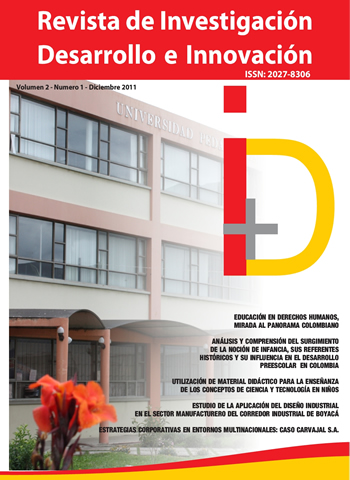Analysis and comprehension of childhood notion, its historical references and its influence in preschool development in Colombia

Abstract
This article deals with the genesis and consolidation of early childhood education or preschool in Colombia, from its source in the pedagogical model of the nineteenth-century France to its enactment as law degree mandatory or Act 115 of 1994 Colombian general education. During this historical review is an analysis of the emergence of the notion of childhood, its evolution, current status and future projections, from three basic considerations such as: The current preschool curriculum model, vision and expectations. This approach to childhood as an important stage in the formation of man, recognized the infant from many factors such as mindset, their families and training among others, which are assessed and analyzed to the fore the initial training as a means of generating the child's understanding of the environment where he lives and building tools to interact socially in all human sense.
Keywords
discovery, education, children, preschool, feeling.
References
- Ariès, P. (1987). El niño y la vida familiar en el Antiguo Régimen. Madrid: Taurus.
- Cerda, H. (1996). Educación preescolar. Historia, legislación, currículo y realidad socioeconómica. Bogotá: Magisterio.
- Enesco, I. (2009). El concepto de infancia a lo largo de la historia. Extraído el 20 de febrero de 2011 de www.ucm.es/info/psicoevo/Profes/IleanaEnesco/Desarrollo/La_infancia_en_la_historia.pdf .
- Fandiño, G., Carrasco, G., Carvajal, M., Gómez, L., Barbosa, S., Betancourt C.,…, Valderrama, N. (2010). Lineamientos pedagógico y curricular para la educación inicial en el Distrito Bogotá. Alcaldía Mayor de Bogotá, Secretaría Distrital de Integración Social, Secretaría de Educación Distrital. Extraído el 5 de Mayo, de http://www.unisabana.edu.co/fileadmin/Documentos/Pedagogia_Infantil/lineamiento_educacion_inicial.pdf.
- Gómez, H. (1997). Educación: la agenda del siglo XXI hacia un desarrollo Humano. Programa de naciones Unidas para el desarrollo. Extraído el 20 de Febrero, 2012, de http://www.ing.unal.edu.co/admfac/iei/comunicados/docs/educacion_agenda_siglo_XXI.pdf.
- Hurtado, M. y Quiñonez, E. (2000). Laminas AIPI Historia de preescolar. Instituto Técnico Superior Popayán. Extraído el 5 de Mayo, 2010 de http://es.scribd.com/doc/53397235/ANTECEDENTES-HISTORICOS-DE-LA-EDUCACION-PREESCOLAR-EN COLOMBIA.
- Instituto Colombiano de Bienestar Familiar ICBF. (2004). Plan País, Plan decenal de infancia 2004 – 2015 para Colombia. Instituto Colombiano de Bienestar Familiar, Gobierno Nacional de Colombia. Extraído el 15 de Febrero, 2012, de https://www.icbf.gov.co/icbf/directorio/portel/libreria/pdf/plan-pais2004-2015.pdf.
- Jaramillo, L. (2010). Concepción de infancia. Extraído el 10 de febrero, 2011, de http://documentosdetrabajo2010.blogspot.com/2010/07/concepcion-de-infancia-por-leonor.html.
- Ministerio de Educación Nacional MEN, (1994). LEY 115 DE 1994 (febrero 8), Diario Oficial No. 41.214, de 8 de febrero de 1994. Por la cual se expide la ley general de educación. Extraído el 20 de Febrero, 2011, de http://menweb.mineducacion.gov.co/normas/concordadas/Decreto115.htm.
- United Nations Educational Scientific and Cultural Organization UNESCO. (2000). El desarrollo del niño en la primera infancia. Programa de Cooperación UNESCO-UNICEF. Compendio 18. Extraído el 20 de Febrero, 2012, de http://unesdoc.unesco.org/images/0006/000695/069549so.pdf.
- Vasco, C. (2006). Siete retos de la educación colombiana para el periodo de 2006 a 2019. Universidad EAFIT. Medellín marzo de 2006. Extraído el 16 de Mazo, 2011, de http://www.eduteka.org/RetosEducativos.php.